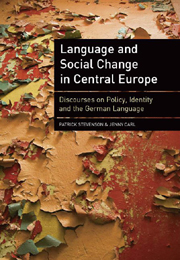We are experiencing issues with the responsiveness of Cambridge Core and the Cambridge Aspire website. Users may experience website error pages or timeout error pages. Our teams are working to resolve the issues. We apologise for any inconvenience caused.
Book contents
- Frontmatter
- Contents
- Acknowledgements
- List of Tables
- Transcription Conventions
- Map of Central Europe
- 1 Introduction
- 2 Discourses on Language in Social Life: Theoretical and Methodological Orientations
- 3 Sociolinguistic Histories and the Footprint of German in Eastern Central Europe
- 4 Language Policy Discourses: Interventions and Intersections
- 5 Language (Auto)biographies: Narrating Multilingual Selves
- 6 Language Ideologies: Negotiating Linguistic Identities
- 7 Conclusions
- Appendix A European Institutions and Documents Concerning Language Policy
- Appendix B Preamble to the European Charter for Regional or Minority Languages
- Appendix C Introduction to the 2005 Commission Communication ‘A New Framework Strategy for Multilingualism’
- Appendix D Introduction to the 2008 Commission Communication ‘Multilingualism: an asset for Europe and a shared commitment’
- Appendix E German and Austrian agents and institutions in foreign cultural policy
- Appendix F Extract from ‘Auswärtige Kulturpolitik – Konzeption 2000’
- Appendix G Central focus – ‘Leitbild’ – of the Goethe-Institut
- Appendix H Austria's Auslandskulturkonzept NEU
- Appendix I Plattform Kultur Mitteleuropa – Platform Culture Central Europe
- Appendix J Extract from Austria kulturint – Tätigkeitsbericht 2002
- Appendix K Czech 2001 White Paper on Education
- Appendix L Czech 2004 Education Act
- Appendix M Extract from Czech Follow-up of Action Plan on Language Learning and Linguistic Diversity
- Appendix N Hungarian 1997 Directive Concerning the Education for National and Ethnic Minorities
- Appendix O Extract from 2007 Hungarian National Core Curriculum
- Appendix P Extract from Hungarian Follow-up of Action Plan for Language Learning and Linguistic Diversity
- References
- Index
Appendix M - Extract from Czech Follow-up of Action Plan on Language Learning and Linguistic Diversity
Published online by Cambridge University Press: 05 February 2013
Book contents
- Frontmatter
- Contents
- Acknowledgements
- List of Tables
- Transcription Conventions
- Map of Central Europe
- 1 Introduction
- 2 Discourses on Language in Social Life: Theoretical and Methodological Orientations
- 3 Sociolinguistic Histories and the Footprint of German in Eastern Central Europe
- 4 Language Policy Discourses: Interventions and Intersections
- 5 Language (Auto)biographies: Narrating Multilingual Selves
- 6 Language Ideologies: Negotiating Linguistic Identities
- 7 Conclusions
- Appendix A European Institutions and Documents Concerning Language Policy
- Appendix B Preamble to the European Charter for Regional or Minority Languages
- Appendix C Introduction to the 2005 Commission Communication ‘A New Framework Strategy for Multilingualism’
- Appendix D Introduction to the 2008 Commission Communication ‘Multilingualism: an asset for Europe and a shared commitment’
- Appendix E German and Austrian agents and institutions in foreign cultural policy
- Appendix F Extract from ‘Auswärtige Kulturpolitik – Konzeption 2000’
- Appendix G Central focus – ‘Leitbild’ – of the Goethe-Institut
- Appendix H Austria's Auslandskulturkonzept NEU
- Appendix I Plattform Kultur Mitteleuropa – Platform Culture Central Europe
- Appendix J Extract from Austria kulturint – Tätigkeitsbericht 2002
- Appendix K Czech 2001 White Paper on Education
- Appendix L Czech 2004 Education Act
- Appendix M Extract from Czech Follow-up of Action Plan on Language Learning and Linguistic Diversity
- Appendix N Hungarian 1997 Directive Concerning the Education for National and Ethnic Minorities
- Appendix O Extract from 2007 Hungarian National Core Curriculum
- Appendix P Extract from Hungarian Follow-up of Action Plan for Language Learning and Linguistic Diversity
- References
- Index
Summary
Building a Language-Friendly Environment
An inclusive approach to linguistic diversity
National and regional authorities are encouraged to give special attention to measures to assist those language communities whose number of native speakers is in decline from generation to generation, in line with the principles of the European Charter on Regional and Minority Languages. Member States are encouraged to give special attention to measures to assist language communities whose number of native speakers is in decline from generation to generation, in line with the principles of the European Charter on Regional and Minority Languages.
a) What concrete actions (if any) have been accomplished in this field since 2004?
The Education Act of 2004 states that a municipality, a region or the Ministry shall ensure education for members of national minorities in the language of the relevant minority at nursery, ‘basic’ (primary and lower-secondary) and secondary schools. Should at least eight children claim to be members of a national minority, a class of the relevant grade of nursery school may be set up; should at least ten pupils claim to be members of a national minority, a class of the relevant grade of basic school may be set up. A nursery school or basic school with the language of the national minority may be established provided that all classes have on average at least twelve pupils.
Should at least twelve pupils claim to be members of a national minority, a class of the relevant grade of upper-secondary school may be set up;
an upper-secondary school with the language of the national minority as the language of instruction may be established provided that all classes have on average at least fifteen pupils who claim to be members of the national minority.
Information
- Type
- Chapter
- Information
- Language and Social Change in Central EuropeDiscourses on Policy, Identity and the German Language, pp. 241 - 242Publisher: Edinburgh University PressPrint publication year: 2010
Accessibility standard: Unknown
Accessibility compliance for the PDF of this book is currently unknown
and may be updated in the future.
